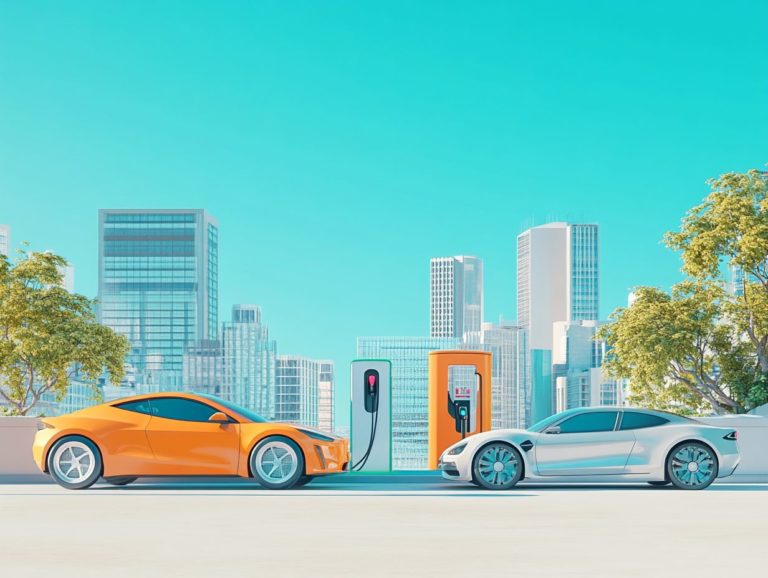5 Trends in Car Comparison Tools for 2024
As the automotive landscape evolves, car comparison tools are seamlessly adapting to innovative trends that enhance your car-buying experience.
In 2024, advancements such as artificial intelligence (AI) integration and virtual reality showrooms are revolutionizing the way you research and select your vehicles.
This article highlights five key trends shaping these tools, ranging from personalized recommendations to real-time inventory updates.
Discover how these features can simplify your decision-making and elevate your overall experience, setting the stage for future advancements in automotive technology.
Contents
- Key Takeaways:
- 1. Artificial Intelligence Integration
- 2. Virtual Reality Showrooms
- 3. Personalized Car Recommendations
- 4. Real-Time Pricing and Inventory Updates
- 5. Enhanced User Experience with Mobile Apps
- How Do Car Comparison Tools Work?
- Frequently Asked Questions
- Discover the Future of Car Comparison Tools!
- What are the top 5 trends in car comparison tools for 2024?
- How will AI be used in car comparison tools in 2024?
- What new customization options can we expect in car comparison tools for 2024?
- How will virtual reality be used in car comparison tools in 2024?
- Will car comparison tools in 2024 be more mobile-friendly?
- What sustainability metrics will be included in car comparison tools for 2024?
Key Takeaways:
- Artificial intelligence will be integrated into car comparison tools, allowing for more accurate and personalized recommendations.
- Virtual reality showrooms will become a popular feature in car comparison tools, allowing users to experience cars in a virtual setting.
- Personalized car recommendations will be a key feature, tailoring results to each user’s specific needs and preferences.
1. Artificial Intelligence Integration
Integrating artificial intelligence (AI) in cars is changing the industry, allowing for smart services that improve vehicle performance and your experience. As AI technologies continue to evolve, they not only transform the design and functionality of electric vehicles but also impact market dynamics across urban environments and emerging markets, propelling the mobility revolution forward.
For example, Tesla uses smart AI algorithms for predictive analytics. This helps them predict maintenance needs and manage batteries better, ultimately enhancing the reliability of their vehicles.
AI helps manufacturers understand user behavior better, facilitating the creation of personalized features tailored to individual preferences. Consider adaptive cruise control systems that learn your driving habits or infotainment systems that curate music playlists based on your listening history.
With AI improving efficiency, automakers can streamline production processes, minimize waste, and bolster overall safety measures, reinforcing their commitment to innovation in an ever-evolving automotive landscape.
2. Virtual Reality Showrooms
Virtual reality (VR) showrooms are changing how we buy cars, delivering immersive experiences that elevate consumer engagement and streamline your car-buying journey.
You want more interactive and personalized experiences; VR has emerged as a formidable tool for showcasing electric vehicles and shared mobility solutions. Take Tesla and Ford, for instance; they use virtual reality in their marketing, enabling you to explore vehicle features and even take simulated test drives—all from the comfort of your own home.
This modern approach meets the needs of urban buyers like you and offers invaluable insights into consumer tastes, allowing manufacturers to fine-tune their offerings to meet your evolving needs. By creating an engaging and informative atmosphere, VR reflects a genuine commitment to understanding what modern city dwellers seek in eco-friendly transportation options.
3. Personalized Car Recommendations
Personalized car recommendations use smart algorithms to analyze your behavior, preferences, and market trends, giving you options that fit your lifestyle and eco-friendly values.
Using data analysis and machine learning, these systems delve into extensive user data—from past purchases to your social media interactions—crafting a detailed profile just for you.
These insights help car companies make better design and marketing choices, significantly enhancing your engagement as a consumer.
In the electric vehicle sector, these targeted recommendations not only boost the likelihood of sales but also promote adoption within shared mobility services, making it easier for you to find electric options that match your eco-friendly goals.
The integration of responsive feedback loops guarantees you receive relevant suggestions continuously, creating an ongoing, personalized experience that evolves alongside your needs.
4. Real-Time Pricing and Inventory Updates
Real-time pricing and inventory updates are transforming the car market, granting you immediate access to crucial information that enhances your buying experience while bolstering investment in electric vehicle charging infrastructure.
This technology helps you make decisions faster and has a profound impact on supply chain management within the industry. By leveraging data analytics, manufacturers can better anticipate demand trends and adjust production schedules, leading to minimized inventory costs.
Recent studies reveal that vehicles equipped with real-time data capabilities have enjoyed a 15% increase in sales, particularly in the electric and shared mobility sectors, where transparency and accessibility are paramount. A significant percentage of buyers express greater satisfaction when they have continuous access to accurate inventory updates, highlighting the crucial role technology plays in creating a more efficient automotive marketplace.
5. Enhanced User Experience with Mobile Apps
Enhanced user experience through mobile apps is becoming a cornerstone of the automotive industry, enabling seamless interactions between you and your transportation solutions while fostering greater engagement in the rapidly evolving mobility ecosystem.
These applications do more than just provide convenience; they incorporate features like remote vehicle monitoring, allowing you to keep an eye on battery status, location, and maintenance needs in real time. With the capability for automatic updates, your vehicle can continuously evolve with the latest software improvements, all without you lifting a finger.
Integration with smart city initiatives—projects designed to enhance urban living through technology—further boosts the value of these apps, giving you effortless access to real-time traffic data, parking availability, and charging station locations. This comprehensive connectivity is redefining how you engage with electric vehicles and shared mobility, making transportation not just more efficient, but also remarkably user-friendly.
How Do Car Comparison Tools Work?
Car comparison tools operate by aggregating data from a variety of sources within the automotive value chain, offering you insightful comparisons of vehicle specifications, pricing, and performance. This is especially beneficial in a market where transportation habits are constantly evolving.
These tools meticulously gather and analyze information from manufacturers, dealerships, and user reviews, synthesizing it into an easily digestible format that highlights key differences and advantages. For instance, platforms like Edmunds and Kelley Blue Book enable you to filter vehicles based on specific features and price ranges, transforming what could be a daunting research process into streamlined comparisons.
Tools like CarGurus utilize user-generated data to pinpoint fair market prices, making it easier for you to identify great deals. By integrating reviews and real-time pricing data, these tools enable you to make informed choices that align with your needs, significantly enhancing your understanding of the market landscape.
What Are the Benefits of Using Car Comparison Tools?
Using car comparison tools offers you a wealth of advantages, enabling you to make well-informed decisions while optimizing your purchasing experience and deftly navigating the complexities of the automotive market.
These tools save you time by letting you quickly compare prices, fuel efficiency, and features. They also assist in pinpointing the best financing options tailored specifically to your needs. As the market increasingly shifts toward electric vehicles and shared mobility, these comparison tools are evolving to meet your changing preferences, providing insights into sustainability ratings and ownership costs.
This adaptability ensures you are well-equipped to select vehicles that not only align with your lifestyle requirements but also contribute positively to the environment.
What Are the Different Types of Car Comparison Tools Available?
You’ll find a variety of car comparison tools at your disposal, each tailored to meet your unique preferences. Whether you prefer online platforms, mobile applications, or dealership-integrated systems, these resources are designed to help you make informed decisions in the automotive landscape.
These tools range from straightforward online calculators that help you compare basic specifications and pricing to advanced mobile applications that provide real-time data, including fuel efficiency, user reviews, and environmental impact scores. As the automotive market continues to evolve, segmentation becomes essential in tailoring these tools to address the diverse needs of consumers. This is particularly important in emerging markets where budget constraints and varying levels of automotive knowledge are prevalent.
By personalizing features and functions, developers ensure that every user—be it a first-time buyer or a seasoned enthusiast—can make informed choices and enhance their purchasing experience.
What Are the Key Features to Look for in a Car Comparison Tool?
When exploring a car comparison tool, it’s essential to seek out features that elevate your experience. Look for user-friendly interfaces that make navigation easy, accurate real-time pricing, and extensive vehicle databases that enable you to make informed decisions.
Effective filter options should allow you to refine your choices based on your specific needs, whether it’s budget, fuel efficiency, or safety ratings. Detailed specifications are crucial, providing insights into engine performance, technology features, and warranty information, enabling you to conduct side-by-side evaluations with ease.
Comparison metrics should succinctly highlight the strengths and weaknesses of various models, simplifying your decision-making process. Customer reviews provide real-world experiences and satisfaction levels that guide you toward selecting the best vehicle tailored to your lifestyle and preferences.
How Can Car Comparison Tools Help with Decision Making?
Car comparison tools elevate your decision-making process by offering critical insights and analyses that navigate the complexities of the automotive landscape. This ultimately guides you toward more satisfying purchasing choices.
These innovative resources leverage graphical data presentation to present information in a clear and intuitive format, making comparisons easier to grasp. You can engage in what-if comparisons, predicting how various choices might translate into real-world outcomes. Personalized recommendations play a vital role, adapting to your unique preferences and needs to streamline your experience.
As the marketplace evolves with the rise of electric vehicles and shared mobility, these tools become essential in navigating emerging trends, ensuring you make informed choices that align with the latest innovations and market dynamics.
What Are the Future Developments in Car Comparison Tools?
Get ready for future developments in car comparison tools that will embrace the latest technology. Imagine AI-driven analytics, augmented reality features, and finer market segmentation working together to adapt to the ever-evolving automotive landscape.
Picture this: real-time VR comparisons that allow you to visually explore a range of vehicles in a fully immersive virtual environment. It’s like stepping into your dream car without ever leaving your living room. AI-based personalized suggestions will cater to your unique preferences, ensuring the options presented are relevant and tailored specifically for you.
Enhanced mobile integration means you can access these tools effortlessly while on the move, enabling you to make informed decisions at your convenience. Plus, with a focus on sustainability, these advancements will shine a light on eco-friendly vehicles, nudging you to consider greener options. This aligns with your values and fosters greater engagement with clients who share your commitment to environmental consciousness.
Frequently Asked Questions
.jpg_11.jpeg)
Discover the Future of Car Comparison Tools!
What are the top 5 trends in car comparison tools for 2024?
The top 5 trends in car comparison tools for 2024 are: increased use of artificial intelligence, enhanced customization options, integration with virtual reality technology, improved mobile compatibility, and incorporation of sustainability metrics.
How will AI be used in car comparison tools in 2024?
In 2024, car comparison tools will use AI to offer personalized recommendations based on users’ preferences and driving habits. They will also analyze data from various sources to determine the best vehicle options for each individual.
What new customization options can we expect in car comparison tools for 2024?
In 2024, car comparison tools will provide advanced customization options. Users will be able to choose specific features and accessories for a vehicle and compare multiple customized vehicles side by side. Expect a more tailored experience!
How will virtual reality be used in car comparison tools in 2024?
In 2024, expect car comparison tools to use virtual reality. Users will enjoy virtual test drives and explore vehicles in a more realistic way, making comparisons more immersive.
Will car comparison tools in 2024 be more mobile-friendly?
Absolutely! Car comparison tools will be mobile-friendly with responsive designs, making it easy for users to access and compare vehicles on-the-go. Enhanced customization options will also be available on various devices.
What sustainability metrics will be included in car comparison tools for 2024?
In 2024, car comparison tools will include sustainability metrics, such as fuel efficiency, carbon emissions, and overall environmental impact. These features will help users choose better, eco-friendly vehicles when comparing options.

.jpg_00.jpeg)
.jpg_01.jpeg)
.jpg)



